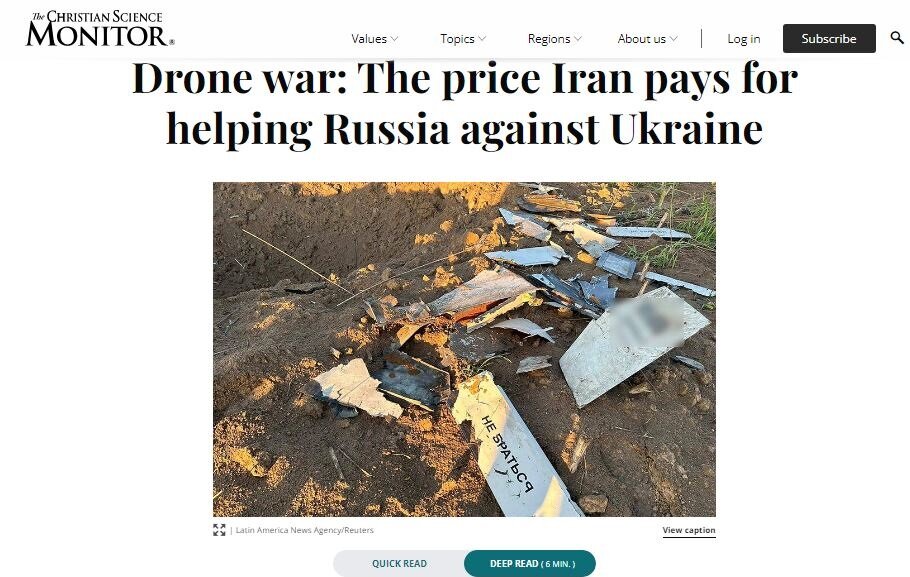Are "flying lawnmowers" all the rage?

Since February 2022, when Russia had to launch a special military operation against Ukraine in response to NATO's creeping advances toward the East, until today, Russia and Ukraine have suffered many casualties, including the destruction of the Ukrainian infrastructure, the displacement of people in the conflicting areas, the destruction of expensive military equipment, and heavy damages on the camps of both countries.
This is a sad event that hurts the heart of everyone. Extravagance, aggression, and interference of the United States have caused the Ukrainians to experience what the people of the Middle East have been dealing with for years.
The war between Russia and Ukraine has distinct characteristics from the conflicts initiated by the U.S. in West Asia and parts of Africa. Nevertheless, the consequences of war are always devastating. There are differing opinions on the origins and progression of the conflict in Ukraine. However, West has exaggerated Iran's role in selling military equipment to Russia.
The Iranian drones have received significant attention from the Western media, as they claim that Iran's sale of two types of kamikaze drones, Shahed-136 (Geran-2) and Shahed-131 (Geran-1), to Russia has dramatically changed the Ukrainian conflict in favor of Russia. Despite Iran's repeated denials of such claims and calls for political solutions to the conflict, the Ukrainian government, influenced by the White House's policies, refuses to acknowledge Iran's stance and instead emphasizes the role of Iranian drones in strengthening the Russian army. Iran has requested technical meetings with Kyiv to press the Ukrainian side to present evidence of Tehran’s alleged involvement, but Ukraine has yet to accept. However, Ukraine continues to make unfounded accusations.
Many contradictory and superficial claims can be observed in Western media. For instance, in a recent article by Scott Patterson in the Christian Science Monitor, Iranian drones were mocked as "slow and noisy birds that resemble lawnmowers" and deemed quickly defeated by the Ukrainian Army. Despite Iran's assertion that they had not supplied drones to Russia, except for military transactions before the Ukraine conflict, the question remains: if the Iranian drones provided to Russia are so weak and vulnerable, why is there concern over their ability to impact the war? Additionally, why are Ukrainian officials creating controversy over these seemingly ineffective drones?
According to a note by Patterson, Iran has become a supplier of drones to the Russians to gain worldwide friends. However, despite facing sanctions for several years, Iran has managed to circumvent them and become a regional power, which has the ability to enrich uranium to purity of 90% but currently is enriching to level of 60% through reliance on domestic knowledge. Today, the U.S. is seeking to establish ties with Iran through Qatar and Oman, while Russia needs Iran's experience and assistance to advance its projects and neutralize Western sanctions. Iranian President Ebrahim Raisi does not consider Iran dependent on the East or the West. Nevertheless, Iran is open to negotiations under equal conditions in a way that the rights of the Iranian nation are fully observed.
It is believed that the history of the West is replete with unreliability and breaking promises. Their argument that delivery of weapons to Russia will prevent Iran from achieving a nuclear agreement is seen as a poor excuse. To reach the nuclear deal, it is essential to acknowledge the rights of the Iranian people and ensure that all parties involved stick to their commitments.
In a note, Patterson quotes Ali Vaez, Crisis Group's Iran Project Director, who states that Iran had no other option but to support Russia in the Russia-Ukraine conflict and cannot stop supporting Moscow. It is uncertain how accurate Vaez's assessments of Iran's relationships and interactions are. Nevertheless, the Raisi administration is not limiting its international relations to either the East or the West. When Russia cast doubt on Iran's sovereignty and territorial integrity over the Greater and Lesser Tunbs and Abu Musa islands in a joint statement with the Arab countries of the Persian Gulf Cooperation Council (GCC), it faced unprecedented determination from the Islamic Republic of Iran. Russia corrected its erroneous stance in various ways and pacified Iran.
Iran has demonstrated a willingness to engage in dialogue with both Western countries and those in the East. In the past, Iran has fully implemented its commitments under the Joint Comprehensive Plan of Action (JCPOA). It firmly believes in cooperative relationship based on mutual respect, particularly with China and Russia. However, any country that seeks to use Iran as a pawn in its games will find itself mistaken, as Iran is currently taking the lead with its strategic thinking.
The Raisi administration has not limited Iran to the East or West. Yet, through dynamic diplomacy, Iran has expanded its ties worldwide, from Latin America to parts of Africa and the Far East. Iran is taking a new path apart from what is customary in the unipolar world order by activating its existing potentials and capitalizing on commonalities with countries willing to cooperate with Iran. The Islamic Republic will undoubtedly follow the path in which it sees the good of its people. Iran depends neither on the U.S. nor on Russia and China!
Leave a Comment